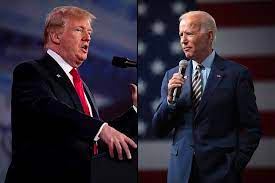
As America approaches the 2024 presidential election, a historically impotent position in government is becoming more important than ever. The age of candidates is raising concerns that the two most likely hopefuls for the presidency, especially they may not be able to finish their terms and could be replaced by their right hands. Typically, the second name in presidential campaigns is often disregarded by voters, but in 2024, it may be more influential than ever.
Current polls show that in 2024 the incumbent, President Joe Biden, and former President Donald Trump are the most likely competitors for the seat. Biden is set to start campaigning in 2024 with running mate Kamala Harris. It seems likely that Trump will represent the Republican party but nothing is certain; just like his vice-president. As of now, both of these prospective presidents have yet to receive their party’s nomination.
Biden recently turned 81. A victory next year would again mark him the oldest American to be elected President of the United States. However, the next oldest candidate to be elected president was Donald Trump in 2016, who was 70 years old at the time. Trump is now 77 years old. Even if the controversial, and possible independent candidate, RFK Jr. makes it onto the ballot, at 69 years, if elected, he would also be one of the oldest presidents.
Historically, presidents have been younger. 35 of the 68 inaugurated presidents were between the ages of 50 and 59 when they were sworn in. Only four have been 70 to 79 years old (Reagan twice, Trump and Biden); 19 were between the ages of 60 and 69. Notably, the U.S. elected its oldest President in the past decade. However, five out of the ten oldest presidents served in the 1700s-1800s and, before Biden and Trump, the president’s ages were actually below average at about 56 years old.
Americans seem to feel better about younger candidates. In July 2023, a survey showed that when asked what the ideal age of a president is, the majority of Americans (69%) want someone who is under 60. Just about half (49%) state they prefer someone in their 50s, 24% say it’s best for a president to be in their 60s and 17% say they should be in their 40s. 3% of Americans say they favor a president in their 70s or older and an equally small percentage (3%) say it’s best for a president to be in their 30s. (The minimum age to run for president is 35).
If this survey is truly representative of the American people, then Trump and Biden are quite unfavorable based on their age alone.
Voters should be aware that there is a realistic chance that neither of these men will finish out another term as president. Especially since, in 2021, the average life expectancy for men was only 73 years. So when we are filling out our ballots next November, pay attention to the vice president.
Typically, the VP has a simple job: presiding over the Senate and fulfilling the president’s duties if they are not able to do so. But with aging chief executives, it is becoming ever more possible that Harris and whoever Trump selects could be the next president of the U.S.
And if Americans are voting with a heightened awareness of the importance of the VPs, then it probably won’t bode well for Biden and the Democrats. In May 2021, 37% of Americans disapproved of Harris. Now, in Nov. 2023, Harris is not any more popular; with roughly 54% disapproving of her. It is still unclear who Trump will choose as his running mate.
Beyond policy and promises, age will weigh heavily on people’s decisions at the ballots in 2024.

